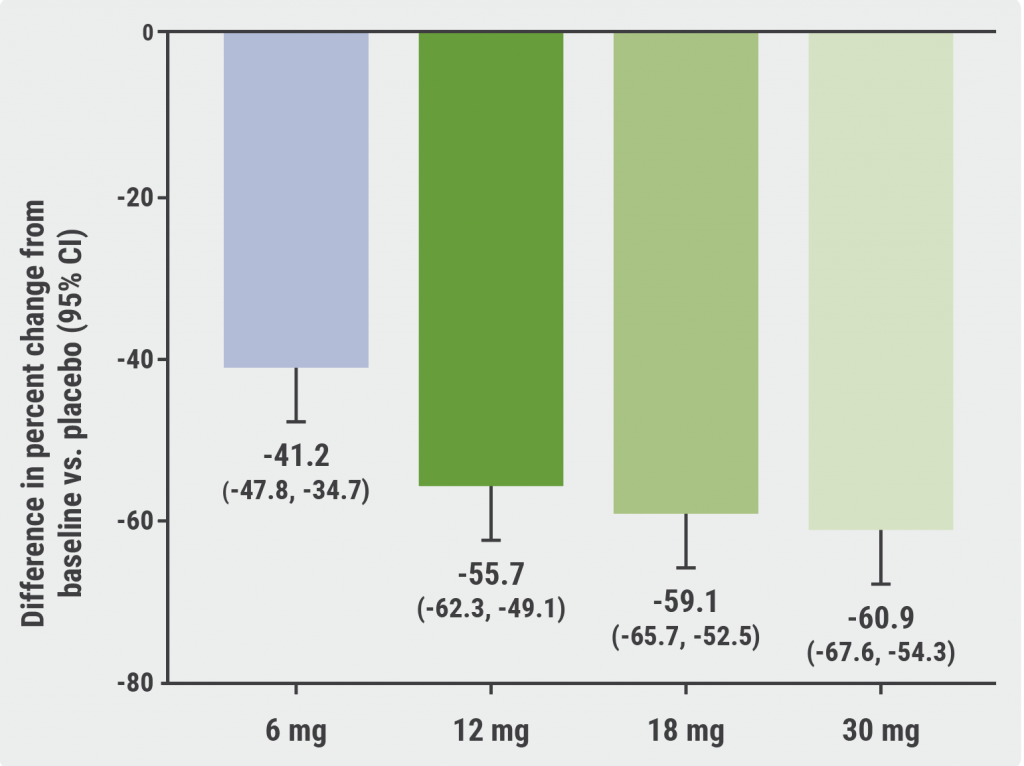https://doi.org/10.55788/629cbf29
Prof. Christie Ballantyne (Baylor College of Medicine, TX, USA) explained that injectable treatments targeting proprotein convertase subtilisin/kexin type 9 (PCSK9) have been shown to provide “excellent” reductions in LDL-C and the risk of atherosclerotic cardiovascular disease, but they have been poorly adopted due to access barriers and the need for multiple injections [1]. “An oral PCSK9 inhibitor may widen access and improve the attainment of guideline-recommended treatment goals.”
An oral PCSK9 inhibitor with the provisional name of MK-0616 was subjected to a phase 2b randomised controlled trial (NCT05261126) [1]. The straightforward primary objective was per cent change from baseline in LDL-C at week 8 in participants with hypercholesterolemia. A total of 381 adults were enrolled; 49% were women, and the median age was 62 years. They had a mean LDL-C of 119.5 mg/dL and 38.6% had clinical atherosclerotic cardiovascular disease; about 60% were taking a statin at study entry. Participants were randomised to placebo or one of the 4 doses of MK-0616 for 8 weeks, after which treatment was withdrawn to assess adverse events in the following 8 weeks.
All doses of MK-0616 demonstrated statistically superior and dose-dependent reductions in LDL-C versus placebo (P<0.001). Efficacy was nearly complete after 2 weeks, and a persistent effect over the 8-week treatment period was observed, as measured by the least squares mean percentage change in LDL-C. The Figure shows the primary endpoint results for the efficacy population.
Figure: LDL-C significant percent change from baseline versus placebo at week 8 for the efficacy population [1]

Apolipoprotein-B (ApoB) was also significantly lowered at week 8, with a mean difference versus placebo of 32.8% (6 mg group) to 51.8% (30 mg group). The reduction versus placebo in non-HDL-C was between 35.9% and 55.8%, in these dosage groups. The proportion of patients who attained LDL-C goals ranged from 80.5% to 90.8%, versus 9.3% in the placebo group.
MK-0616 was well tolerated; the proportion of participants with ≥1 adverse event was between 39.5% and 43.4% in the treatment arms and 44.0% in the placebo arm.
- Ballantyne CM. Efficacy and safety of the oral PCSK9 inhibitor MK-0616: a phase 2b randomized controlled trial. Session 410-16, ACC Scientific Session 2023, 4–6 March, New Orleans, USA.
Copyright ©2023 Medicom Medical Publishers
Posted on
Previous Article
« Baxdrostat in patients with uncontrolled hypertension Next Article
Inflammation stronger predictor of MACE than cholesterol levels »
« Baxdrostat in patients with uncontrolled hypertension Next Article
Inflammation stronger predictor of MACE than cholesterol levels »
Table of Contents: ACC 2023
Featured articles
Pulmonary Arterial Hypertension
Sotatercept improves exercise capacity in patients with PAH
Fixed-dose macitentan plus tadalafil superior to either agent alone in PAH
Coronary Revascularisation
Immediate complete revascularisation non-inferior to staged complete revascularisation
RENOVATE-COMPLEX-PCI results support intravascular-guided PCI for complex lesions
Heart Failure and Cardiomyopathy
No need to restrict vigorous exercise in selected HCM patients?
No difference in CV outcomes between PET or CMR and SPECT
Interventional and Structural Cardiology
Benefits of MitraClip sustained to 5 years in COAPT trial
Transcatheter repair for patients with tricuspid regurgitation
Minimally invasive versus conventional sternotomy for mitral valve repair
Durable benefits of TAVR versus surgical aortic valve replacement in aortic stenosis patients
PCI not better than GDMT in severe ischaemic cardiomyopathy
Prevention
Anticoagulation in non-critically ill hospitalised COVID patients
Statins associated with reduced heart dysfunction from anthracyclines
Multifaceted strategy improves prescription of therapies for diabetes and ASCVD
Dyslipidaemia
Bempedoic acid benefits statin-intolerant patients at high cardiovascular risk
Evolocumab improves coronary plaque morphology in stable CAD
Inflammation stronger predictor of MACE than cholesterol levels
Oral PCSK9 inhibitor significantly lowers LDL-C
Miscellaneous
Baxdrostat in patients with uncontrolled hypertension
Hormone therapy for gender dysphoria associated with increased CV risk
Pulsed-field ablation appears safe and effective for atrial fibrillation
Key correlates of incident dementia identified in the MESA study
Related Articles
January 12, 2022
After initial dip, dementia risk rises with diabetes duration
September 7, 2023
Towards cell biology of Alzheimer’s disease
February 19, 2021
Hyperglycemia tied to cognitive decline, vascular dementia
© 2024 Medicom Medical Publishers. All rights reserved. Terms and Conditions | Privacy Policy

